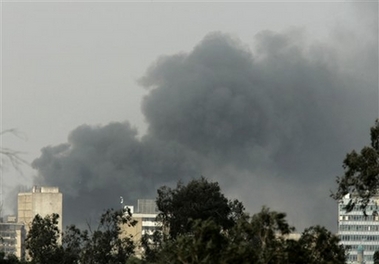28 killed in Baghdad suicide bombing
(AP)Updated: 2007-03-05 18:55
The death toll from police was preliminary and could rise. At least 54 people were injured. The commercial zone is mixed between Sunni- and Shiite-owned businesses and shoppers.
"Papers from the book market were floating through the air like leaflets dropped from a plane," said Naeem al-Daraji, a Health Ministry worker who was driving about 200 yards from the blast and was slightly injured by broken glass from his car window.
"Pieces of flesh and the remains of books were scattered everywhere," he said.
People began driving the injured to hospitals in private cars without waiting for ambulances to arrive.
Sporadic car bombs and attacks have hit the capital in recent days, but none with mass casualties since a blast Friday killed at least 10 people.
In other violence, gunmen opened fire on Shiite pilgrims in two separate incidents around Baghdad on Monday, killing five people, police said.
On Sunday, US and Iraqi troops poured into Baghdad's main Shiite militia stronghold, encountering no resistance in the one-time Sadr City combat zones but testing the Shiites' commitment to the US-promoted campaign to drive militants from the capital.
Iraq's prime minister, meanwhile, ordered an investigation into a British-Iraqi raid on a police intelligence headquarters in southern Iraq that captured an alleged death squad leader and found 30 prisoners with signs of torture.
West of Baghdad, US soldiers described a raid last week that uncovered a suspected Sunni "torture site" and rescued of two Iraqi captives, who apparently had been spared immediate execution because the militants' video camera broke and they wanted to film the killing.
The quiet but dramatic advance in Sadr City - involving nearly 1,200 US and Iraqi forces who didn't fire a shot - marked one of the most significant developments in the security clampdown in Baghdad since it took effect nearly three weeks ago.
But it only received the green light after drawn-out talks between US commanders and political allies of radical Shiite cleric Muqtada al-Sadr and his powerful Mahdi Army. Both sides are watching each other for any wrong moves on the same streets where they battled in the past, including intense urban warfare in 2004.
Al-Sadr's militiamen lowered their profile under intense government pressure to give the security operation a chance to root out both Sunni and Shiite extremists. US military leaders, however, must walk a fine line as part of the tacit truce. They are seeking suspected Shiite death squads leaders, but must keep from squeezing al-Sadr's militia too hard - and risk collapsing the entire drive to reclaim Baghdad from extremists and gangs.
"The indication that we are getting is a lot of the really bad folks have gone into hiding," said Lt. Col. David Oclander shortly after troops moved into Sadr City's teeming grid of low-rise buildings in northeast Baghdad.
Oclander said "not a shot was fired" as troops entered the area, which was constructed in the 1960s to house poor Shiites seeking work in the capital and was known as Saddam City until the former Iraqi leader's fall in 2003.
| 1 | 2 |  |
|
||
|
||
|
|


